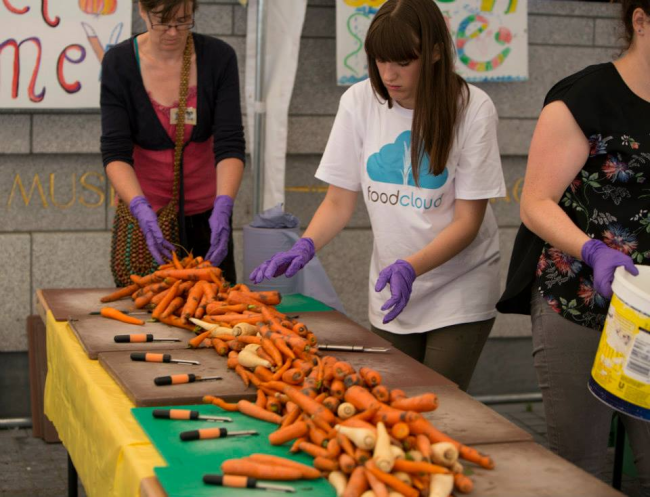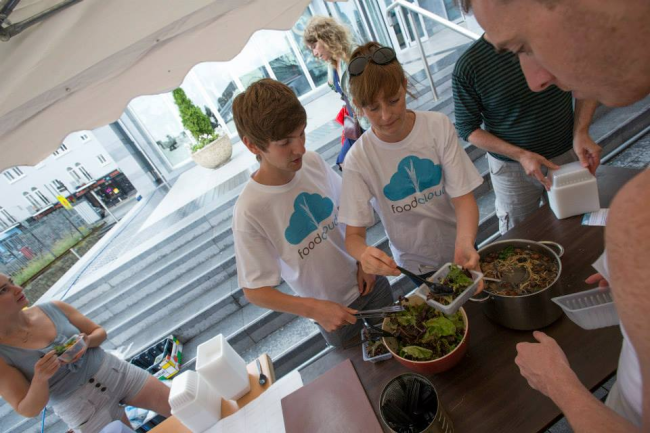Pictured: FoodCloud's core team Alex Sloan, Iseult Ward and Emma Mooney
FoodCloud is an innovative Dublin-based social enterprise set up by students that via a smartphone app links businesses that have surplus food to charities and local community groups so nothing goes to waste and it all goes to a good cause.
The core team consists of Iseult Ward (founder), Emma Mooney (operations) and Alex Sloan (communications) as well as a dozen volunteers and the company was recently the winner of the SEI ‘Minnovation Award’.
The team uses its technology to connect a rich network of local businesses and community organisations to ensure surplus food goes to the right places without the need for a physical food bank.
Using the app or the website businesses who have registered with FoodCloud can upload details of their surplus food and the time period in which the food can be collected.
The app then automatically sends a text message to the nearest community organisation in that area and they can collect the food. If the organisation rejects the offer it is then sent to the next nearest organisation and so on.
Waste not, want not

FoodCloud at the recent Galway Disco Soup
“We started Foodcloud in response to what we’d learnt doing a university dissertation,” Ward explained. “Okay, we know this sounds unlikely, all those long words and boring statistics. But we really couldn’t believe how much food was being wasted.
“However, the more we researched (we are students after all) the more we realised that there was an even greater scandal; food was being wasted when people in our cities were going hungry. So we decided it was time we did something about it.
“With idealistic fervour and under the watchful eye of Enactus FoodCloud was born. Well actually we were called ‘food glorious food’ back then (we all watched too many repeats of Oliver as children).”
“Since then, we have evolved into FoodCloud, a registered non-for-profit company that seeks to redistribute surplus food from businesses to charities.”
Since winning the Social Entrepreneurs Ireland ‘Minnovation Award, the FoodClout team have been awarded a place in the Launchbox, a newly established start up incubator in Trinity College Dublin. It has provided FoodCloud with financial support, space and mentoring over a three month summer programme.
Ward, founder of FoodCloud is originally from Phibsborough in North Dublin and graduated in this year as Trinity College Dublin Business Student of the Year. Alex Sloan, originally from Co Tyrone studies History and Political Science at Trinity College Dublin and will graduate in 2014. Emma Mooney, from Malahide, currently studies Business at TCD and will also graduate in 2014.
How the FoodCloud platform works
Sloan explained that FooodCloud offers businesses an easy quick-to-use app that gives them access to local charities who have signed contracts to cover liability issues.
“The app enables business to do good in their community without cost. The app will simultaneously allow businesses to track food wastage and reduce the costs of theirs waste disposal.
“Charities have had difficult budget cuts which means they are often unable to fulfil the needs of their clients, others can no longer offer the hospitality that made conversations happen.
“We offer charities the opportunity to access food that would otherwise be unavailable to them. Our service also allows charities to only accept the food suitable to meet their needs without damaging relationships if they refuse donations,” Sloan added.
He said that the app technology is currently being leased from US company Zero Percent.
Earlier this month FoodCloud launched a pilot in Dublin’s North East inner city after conducting market research with businesses and charities.
Ward explained: “This area was chosen due to the high density of small charities that serve food as an addition to their primary service and are flexible in the food that they use and in the times they can collect. To ensure the success of the service on a small scale there had to be a certain level of matching done in terms of what food types businesses would supply and what food types were in demand by the various charities. Information gathered from the pilot phase will allow us to easily scale with many more businesses and charitable organisations.
“Our research also led us to realise that grocery products were in highest demand and from that we targeted the major retailers. We launched the pilot with Tesco’s supermarket as our champion business and then the smaller local stores in the area, including a sandwich chain, bakeries and a fruit and veg shop. We aim to target caterers, restaurants and hotels after the pilot, but these food types are logistically more complicated as they would need to be portioned, requiring containers and more effort on the side of the business, and are of a higher risk with health and safety,” she explained.
She said that the company intends to build on the success of the pilot phase by scaling FoodCloud across greater Dublin.
“As we approach 2014, the EU Year of Food Waste, FoodCloud will be taking part in a number of events, both locally and nationally, to raise awareness of the problems of food poverty and food waste. More specifically, FoodCloud will also be showcasing at SocioNex, a social innovation conference being held in Amsterdam this coming November. Further ahead, we would like to reorganize a similar event to the Feeding the 5K which we helped organize last year in Dublin,” she said.
Food for thought

Through Launchbox, FoodCloud has been in regular contact with various investor and is still searching for further investment, Sloan explained.
“Being new to the startup scene, perhaps our biggest challenge, aside from the legal, financial and operational challenges that every start-up faces, was becoming a credible service provider.
“We had to encourage people, from businesses to charities that we can be relied upon. A great deal of time was initially spent on building up relationships with key industry leaders and developing a core network who could be trusted for advice, and who would support our idea and what we were trying to achieve. “
The start-up challenge has clearly energised the FoodCloud team and their advice to other start-ups or people mulling a business idea is to go for it.
“Don’t be afraid to get things wrong. Our initial efforts to get FoodCloud off the ground were not successful. Why? We knew that there was a problem out there and we knew we could help solve it – but we didn’t know our problem well enough. It was only after thorough market research did we truly understand the problem – and our business.
“The research told us exactly what types of food that charities required, the quantity and when. As a result we think we have been able to develop a more effective solution.
“As one of the quotes in our office reads, ‘Ever tried. Ever failed. No matter. Try again. Fail again. Fail better.’”